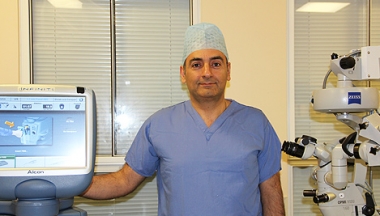General Eye Care

Looking After Your Eyes
Our sight is so important to us and yet many people fail to look after their eye health which unfortunately can lead to sight impairment or even vision loss.
As eye doctors, we encourage people to take positive steps to protect their sight, an action aimed at ultimately improving the nations eye health and contributing towards a reduction in avoidable sight loss.
Regular sight tests are essential for maintaining healthy eyes. More than half of all sight loss is avoidable when detected early and a regular eye test can identify early indications of eye diseases such as Cataract, Glaucoma, Diabetes and Age-Related Macular Degeneration (AMD).
The following are other steps you can take to ensure you are taking better care of your eyes:
Diet - Eat the right foods
Studies show that what we eat can affect our vision. Certain foods are particularly high in antioxidants which can help to prevent retinal damage and certain eye conditions like cataracts and Age-Related Macular Degeneration (AMD). An anti-oxidant which hugely beneficial is lutein, found in many fruit and vegetables.
Foods recommended for eye health include:
- Broadleaf greens such as kale and spinach
- Brightly coloured fruit and veg such as corn, carrots, orange sweet peppers and oranges
- Oily fish like salmon, tuna and mackerel
- Broccoli
- Eggs
Look at your lifestyle habits:
Exercise
Lack of exercise contributes significantly to several eye conditions, particularly amongst people aged 60 and over. Exercise may reduce the risk of sight loss from narrowing or hardening of the arteries, high blood pressure and diabetes.
Alcohol
Excessive alcohol consumption can lead to serious health conditions which can have a detrimental effect on your eye health
Smoking
After ageing, smoking is the biggest risk factor for developing macular degeneration. Smoking also increases your risk of developing a cataract.
Know your family eye health history
Certain eye conditions can be hereditary, such as Glaucoma. When detected early, it can be treated and controlled and therefore it would be very beneficial to know if this condition has been in your family history so you can be tested.
Take care in the sun
Wearing sunglasses reduces the risks of damaging your eyes as a result of the strong ultraviolet light from the suns rays. Check your glasses have a UV factor and carry the CE mark which indicates they meet the European safety standards.
Diabetics
People who have diabetes are at risk of developing a condition called diabetic retinopathy and should ensure they have regular eye tests to enable early detection and treatment.
Computer screen breaks
It is very important to take frequent breaks from your computer screen, at least once an hour to allow your eyes to rest. This will help to avoid problems such as eye strain, lack of focus and headaches. If you have long documents to read, print them off and use to work alongside your computer.




